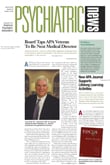The American Red Cross of Greater New York and the September 11th Fund in New York City initiated a joint long-term psychiatric benefit program this summer for people directly affected by last September 11.
“We will reimburse the full cost of treatment for eligible people without health insurance or treatment costs not covered by people’s health insurance,” said Alan Goodman, administrator of the American Red Cross September 11 Recovery Program, told Psychiatric News.
Covered services include individual, group, and family counseling, psychotropic medications, psychiatric hospitalization for up to 30 days, and inpatient and outpatient substance abuse treatment, said Goodman.
The American Red Cross plans to spend $40 million on treatment benefits over the next three to five years on this program, said Goodman. The September 11th Fund will spend between $45 million and $55 million over the next five years on treatment benefits and supporting programs that train mental health professionals in the diagnosis and treatment of trauma survivors. Funds will also go to train teachers, clergy, and others to recognize when treatment is necessary, according to Goodman. Each charity has its own eligibility criteria.
The American Red Cross estimated that about 50,000 families fall into its eligibility categories, which include relatives of the deceased or seriously injured in the attacks on the World Trade Center and the Pentagon, rescue and recovery workers, and displaced residents.
The September 11th Fund estimated that about 100,000 people fall into its eligibility categories, which include workers who lost their jobs because of the September 11 attacks, people evacuated from the World Trade Center and nearby buildings, and children attending schools south of Canal Street and their families, Erin Martin, communications director of the September 11th Fund, told Psychiatric News.
The charities expect that fewer than half of the eligible people will apply for the long-term benefits.
Maggie Tapp, acting director of mental health and mental health services for the American Red Cross, told Psychiatric News, “We have rough estimates of how many people need mental health services based on post–September 11 symptom surveys. But our experience with a similar psychiatric benefit available to eligible families after the 1995 Oklahoma City bombing was that between 15 percent and 40 percent of eligible people used it,” said Tapp.
Organizations Collaborate
The charities partnered with the Mental Health Association of New York City (MHA) to screen clients for eligibility for the new benefits and provide referrals to licensed mental health and substance abuse professionals and clinics.
“We offer an easy entry point to treatment through LifeNet, our toll-free counseling hotline, (800) LIFENET, staffed by trained professionals since 1996,” said John Draper, Ph.D., a psychologist and director of public education and the LifeNet Network for MHA of New York City.
“If someone is ineligible for the benefits funded by the American Red Cross and the September 11th Fund, they may be eligible for other resources including the federally funded Project Liberty, which provides free, short-term crisis counseling,” said Draper.
No Geographic Restrictions
The new benefit program will be publicized along with the LifeNet toll-free number throughout the New York area and nationally by the charities.
Goodman emphasized that the American Red Cross places no geographic restrictions on benefit eligibility. “Relatives of the deceased can call LifeNet to access benefits from anywhere in the world.”
“Because this is a program based on financial need, we want people who have health insurance to use [their insurance] first. But if they prefer to see an out-of-network provider, we will reimburse them for the higher copayment,” said Goodman.
Draper anticipated that approximately 75 percent of people eligible for the benefit program have some type of health insurance.
The charities have hired American Case Management to process claims, check credentials of mental health and substance abuse professionals, and monitor the quality of care that patients receive, said Goodman.
Draper is seeking to expand the referral network of mental health and substance abuse professionals beyond Manhattan.
He recently contacted state associations representing psychiatrists, psychologists, group psychotherapists, social workers, and marriage and family counselors about participating in the LifeNet Network.
James Nininger, M.D., immediate past president of the New York State Psychiatric Association, told Psychiatric News that Draper contacted the state association. “We expressed interest in participating in the treatment referral network. Since September 11, many of our members have volunteered to assist traumatized individuals. Disaster Psychiatry Outreach in New York City recently asked us to contact our members about taking on firefighters who live in outlying areas of the city as new patients. Treatment sessions would be reimbursed by the federally funded Liberty Project,” said Nininger.
The American Red Cross press release announcing the mental health service plan and other aspects of its long-term September 11 Recovery Program is posted on the Web at www.redcross.org/press/disaster/ds_pr/020821longterm.html. A press release from the September 11th Fund is posted on the Web at www.uwnyc.org/sep11/pr_jul11_02.html. ▪
